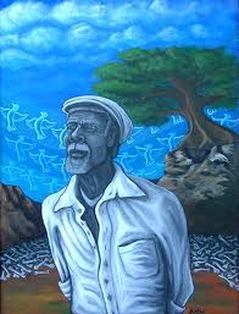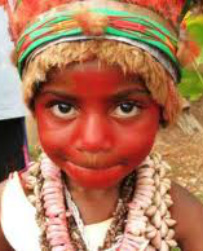The Distribution of Aché
Obatalá is often referred to as the oldest Orichá because, according to most versions of the creation story, he was Olorún's first born. He became the representative of God in the sphere of the universe known as Ayé (earth), and he was charged with overseeing the distribution of aché on earth. Only Olodumare can give life, which occurs when Olorún breathes emi (divine breath) into the empty shell that's the body. According to Lucumí mythology, Obatalá made human bodies out of clay, and once Olorún breathed life into them, the human race began. In this sense, all humans are the creations of God and possess some of God's divine energy, which is aché. Not all humans possess equal amounts of aché, however. As one patakí (sacred story) explains, all the knowledge of the world was at one time contained inside a large pumpkin, and the divine entity known as Ogbedí (Ejiogbé Odí) was given the task of carrying it. He dropped it, and bits and pieces flew all over the universe. Wherever a bit of pumpkin fell, it permeated that space with some aché, but it was no longer possible for one person or one place to have it all. Humans are the living hosts of aché but not all humans are the same; therefore, not all humans have the same kind of aché or the same amount of it. Depending on the person's character, behavior in life and, to some degree, personal destiny, he can acquire more aché or lose what he had. It's important to remember, however, that everything in the universe has some aché, so we should never be disrespectful toward those who are different from us. No one can know for sure how much aché another person may have, because none of us are in full possession of all its mysteries.
The Importance of Iwá, Good Character

We Choose How We Live On Earth
An individual's iwá, or moral and ethical character, is what allows him to live in harmony with aché. Although the Lucumí religion doesn't have the concept of sin in the Christian sense of the word, Olorún knows about our actions on earth and measures out aché in accordance with our behavior. Olorún gave Obatalá the task of teaching moral order and a code of ethics to human beings, and to help humans develop iwá reré, good moral character on earth. This requires humans to be devoted to God, the Orichas and the ancestors, and to treat all of God's creations with respect and reverence. The individual is expected to be a good son or daughter, a good father or mother, a good member of the community, a good godchild or godparent. Following the example of Obatalá, who teaches humans to keep a cool head and reflect before taking action or speaking out of turn, humans should strive to be role models to others around them. Still, humans have free will and can choose how to behave on earth. Those who use their aché for immoral, harmful or evil purposes will suffer the consequences during their lifetime. They'll lose their aché, and by leaving the path of iwá reré, they'll out of harmony with everything around them. They open themselves up to illness, premature death, conflictive relationships, loss, and other forms of osorbo (bad energy, misfortune). Strictly speaking, there's no moral judgment attached to good and bad behavior, but the importance of living correctly is obvious in practical terms. The individual who chooses to develop iwá reré will have a fulfilling life, and the one who chooses not to live ethically will ultimately see bad results. The individual is always responsible for his own actions because God and the Orichás will only help those who help themselves. Aché is the vital energy that makes up life, but it's neither good nor evil in nature. It's neutral, in the sense that an electrical force is neutral. It's very powerful, but it can help or hurt people, depending on how it's used. Lucumí tradition teaches that in order for good to exist in the world, there must also be bad. One can't exist without the other. Ideally, humans should cultivate and use aché to help themselves and others lead productive lives. However, human beings don't always live up to the ideal, and straying from the path of iwá reré on occasion is understood to be part of the human experience.
The Importance of Orí (The Head)

The Human Head Contains Our Destiny
Olorún's aché lives in the Orí (human head), and its presence in the head is called Eledá. Orí is more than the physical head of a person, however. It's like a personal Orichá or guardian angel who takes care of that person. Orí contains the secrets of the human's destiny on earth, and knows how that human can have the most fulfilling life. The concept of destiny in the Lucumí religion is complex, but in simple terms, we can say that each human chooses his own destiny before birth, and in that way, we come to earth with our destiny already written. Olorún breathes emí (sacred breath) into us when we're born, giving us aché, and the divine presence of Olorún in us takes the form of eledá, the aché contained in our physical and spiritual head, or our Orí. Generally, the crown of the human head is considered a sacred spot, because this is where we connect with the divine.

